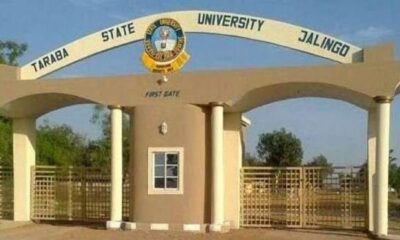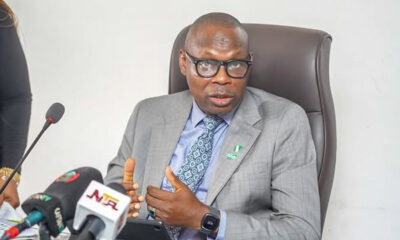Education
ASUU rejects parents’ N10,000 offer, insists on continuation of strike

The Academic Staff Union of Universities (ASUU) has rebuffed the proposed payment of N10, 000 per session by each parent under the aegis of the National Parents Teachers Association of Nigeria (NAPTAN) to aid the Federal Government in funding universities.
In a recent interview, Dr. Ademola Ekundayo, spokesman of NAPTAN, said the action was taken to help the Federal Government meet ASUU’s requests.
“It can be called parents’ support levy for universities. We are at the receiving end of the industrial action. We plead with the ASUU and Federal Government to immediately resolve their differences,” he said.
But, ASUU’s National President, Professor Emmanuel Osodeke, responded to the proposal by rejecting it during an appearance on Arise Television, yesterday.
Instead, he advised the association to put more pressure on government
“I think what this association should be doing is to tell the government to perform its function. They should put pressure on the government to use Nigerians’ money to fund education as it is done in other countries.
“We can’t be calling ourselves the giant of Africa and we are the worst in education. You see students from Nigeria going to Ghana, Benin Republic, Togo, and other small countries to study but nobody from these countries are coming to Nigeria to study.
“So they should add to the pressure coming from ASUU to ensure that the government prioritize education. That is more important than the N10,000.”
•Members’ll decide next step
He enjoined Nigerians to disregard a document on social media that ASUU chapters voted for indefinite strike except a particular university in Niger State.
READ ALSO:
- We don’t have enough medical doctors — NMA disagrees with Minister of Health
- Obi-Datti Movement says Omokri using Obi’s name to stay relevant
- Troops intercepted N3.7bn stolen crude oil, says DHQ
He, however, confirmed that members from all chapters have been invited for a National Executive Council (NEC) meeting next week.
“It’s at that meeting that they would all vote and decide on the next line of action as regards the six months strike.”
He maintained that ASUU, at national level, do not impose decisions on all the chapters, rather, they present matters to them for critical deliberation and decision on what is good for them and other members, considering their peculiarities.
On August 1, ASUU announced an extension of its ongoing nationwide strike by four weeks to, perhaps, give Federal Government more time to satisfactorily resolve all the outstanding issues but from all indications, the issues are yet to be resolved.
Minister of Education, Mallam Adamu Adamu, told State House Correspondents recently that Federal Government and ASUU have reached agreements on virtually all the contentious areas except the issue of six months salary arrears which he said would not he paid because they did not work for it.
•Abiodun appeals for truce
As the feud lingers, Ogun State Governor, Dapo Abiodun, has appealed to both parties to find ways of resolving the crisis for the interest of students and the nation as a whole.
Abiodun, who made the appeal at the inauguration of the Governing-Councils of the state-owned tertiary institutions in Abeokuta, decried the prolonged crisis, which according to him has done more harm to the education sector of the country.
“This is no more a matter of who is right or who is wrong, it is a matter of what is good for the youths of our nation. I, therefore, appeal to both sides to find a meeting point and resolve this crisis for the good of our youths and our nation in general”, he pleaded.
•NANS rises against lecturers
Meanwhile, the National Association of Nigerian Students (NANS) has accused lecturers of deliberately prolonging the strike.
Its President, Sunday Asefon, in a statement, said students have been sympathetic and supportive of ASUU’s demands, but have now decided to withdraw their support because of ASUU has been inconsiderate to students’ plight.
“Since the commencement of this ASUU strike six months ago, NANS has advocated and pushed in favour of ASUU. We directed our protests, advocacy, and struggles against the Federal Government, requesting they accede to the demands of the strike lecturers.
“We have supported their demand for earned allowance, revitalization funds for tertiary institutions, and the adoption of the UTAS platform for the payment of university lecturers against the Federal Government’s insistence on IPPIS. In the same vein, we rejected the Minister of Education’s suggestion that students should hold ASUU responsible and seek legal compensation for liabilities suffered as a result of the strike.
READ ALSO:
- Gunmen kill Inspector of Police guarding bank in Lagos
- We Have Projects To Justify Buhari’s Foreign Debts – Fashola
- Benzema wins UEFA player of the year award
- FG to test locally-made COVID-19 vaccine in November
“Undoubtedly, we have supported ASUU this far because we believed those demands are just and reasonable. But we condemne in totality, the insistence of ASUU on the payment of a six month arrears salary for the entire period of the strike before they can call off the strike.
“This demand is not only insensitive, it is also selfish, inconsiderate, and uncharitable. The six months are periods of no work. As much as we encourage the government to pay their arrears irrespective, it is unfair to base resumption of academic activities on full payment of the arrears.”
•NAAT suspends strike, rejects ‘no work, no pay’ policy
However, the National Association of Academic Technologists (NAAT) has announced the suspension of its three-month strike.
National President of NAAT, Ibeji Nwokoma, who addressed journalists in Abuja, said the decision was taken at the National Executive Council (NEC) meeting because it had secured commitments and resolutions on some of its demands, even as it rejected the ‘No work, No pay’ policy of the Federal Government.
He listed commitments secured from the Federal Government to include the release of enabling circular on CONTISS 14 and 15, agreements on payment of arrears of minimum wage/consequential adjustments, payment of occupational hazard allowance, implementation of responsibility allowance, among others.
He said: “Following this understanding with Government, NAAT as a democratic union directed all its branches to conduct referendum on whether to suspend or continue the strike action. NEC of NAAT met and considered the results from branches hence the decision to suspend the strike effective, Thursday 25th August, 2022.
“The result of the referendum from branches showed that 80.56 per cent voted in favour of suspension of the strike while 19.44 per cent voted for continuation of the strike action.”
But he said at the expiration of the three months window period, NAAT would not hesitate to resume the suspended action without notice if all the issues agreed upon with the education minister on behalf of Government were not holistically addressed.
NAAT had embarked on the strike on 21st March, 2022 to press home its demands which include non-full implementation of FGN/NAAT 2009 agreement, refusal to release enabling circular for the implementation of CONTISS 14 and 15 for academic technologists, non-payment of the arrears of Earned Academic Allowances to our members, among others.
Education
No Scrapping of JAMB: FG Dismisses Viral Rumours
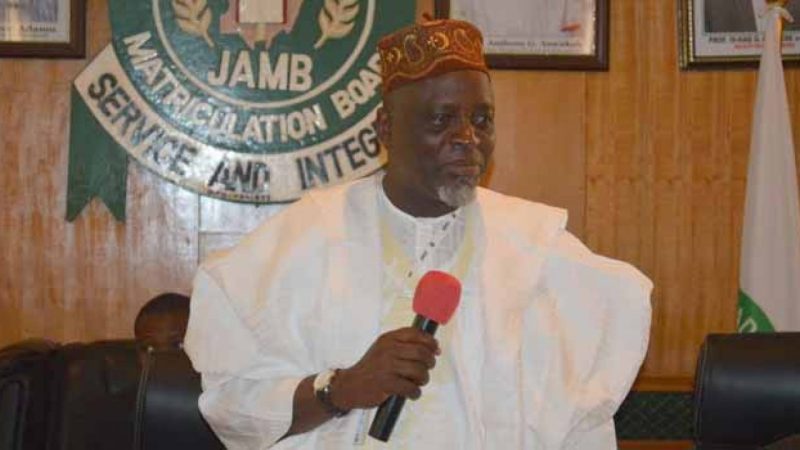
No Scrapping of JAMB: FG Dismisses Viral Rumours
The Federal Government has firmly dismissed viral social media claims suggesting that the Joint Admissions and Matriculation Board (JAMB) has been scrapped as a requirement for tertiary institution admissions in Nigeria.
In a statement issued on Sunday, the Federal Ministry of Education described the reports as false, misleading, and entirely unfounded, stressing that Joint Admissions and Matriculation Board remains the statutory authority responsible for coordinating admissions into universities, polytechnics, colleges of education, and other tertiary institutions nationwide.
The Ministry clarified that no policy decision has been taken by the Federal Government to abolish JAMB or remove it from the admission process. It urged prospective candidates, parents, and guardians to ignore the rumour and rely solely on official government communications.
READ ALSO:
- US Adds 19 More Nigerians to ‘Worst of the Worst’ Deportation List
- Gunmen Storm Gbugbu in Kwara, Residents Flee as Panic Spreads
- FG to Launch Monthly Revenue Transparency Dashboards to Improve Fiscal Accountability
According to the statement, JAMB continues to play a central role in ensuring transparency, fairness, and standardisation through the Unified Tertiary Matriculation Examination (UTME) and the Central Admissions Processing System (CAPS).
“The attention of the Ministry has been drawn to misleading information suggesting that JAMB has been scrapped. This is not true. There is no such directive from the Federal Government,” the statement said.
The Ministry warned individuals and platforms spreading fake news to desist, noting that such misinformation creates unnecessary anxiety among candidates preparing for admission and undermines confidence in the education system.
Candidates were encouraged to continue registration and admission processes strictly in line with JAMB guidelines and instructions from accredited institutions.
Education stakeholders also cautioned against the spread of unverified reports, emphasizing that any major reform to Nigeria’s admission framework would be formally announced through official channels.
The clarification comes as registration activities for the 2026 academic admission cycle continue, with authorities reiterating their commitment to improving access, credibility, and efficiency in higher education admissions across the country.
No Scrapping of JAMB: FG Dismisses Viral Rumours
Education
Reasons Behind UniAbuja’s Expulsion of 28 Students, Withdrawal of 15 Certificates

Reasons Behind UniAbuja’s Expulsion of 28 Students, Withdrawal of 15 Certificates
The University of Abuja (UniAbuja), now renamed Yakubu Gowon University, has expelled 28 students and revoked certificates of 15 graduates following findings of serious academic and disciplinary violations.
The decision was made at the 191st Regular Meeting of the University Senate held on Thursday, January 28, 2026, after reviewing reports and recommendations from the Student Disciplinary Committee (SDC).
Reasons for Expulsion and Certificate Withdrawal
According to a statement signed by Dr. Habib Yakoob, Acting Director of Information and University Relations, the students were found guilty of offences including threats to life, physical assault, examination malpractice, conspiracy, burglary, theft, cult-related activities, possession and use of hard drugs, and falsification of O’Level results submitted during admission. Some students also failed to appear before the committee despite repeated invitations.
The 15 graduates had their certificates withdrawn for similar non-compliance, rendering their credentials null and void. Meanwhile, nine students were cleared after investigations, and 33 others received formal warnings for infractions including conspiracy, hostel racketeering, and fighting.
READ ALSO:
- Yoruba Muslim Group Dismisses Viral Ramadan Date Claim, Reaffirms Sultan of Sokoto’s Authority
- FCT Council polls: APC Wins Four Chairmanship Seats as PDP Takes Gwagwalada
- Dangote Opens Refinery Investment to Nigerians With Public Share Sale Plans
University’s Commitment to Discipline
The Vice-Chancellor and Chairman of Senate, Professor Hakeem Babatunde Fawehinmi, reaffirmed the university’s dedication to maintaining a safe, disciplined, and conducive learning environment. He emphasised that academic integrity is a core principle and that violations would be sanctioned without compromise.
Professor Fawehinmi praised the SDC for its thorough and diligent handling of cases and urged students to conduct themselves responsibly to safeguard their academic futures. He also highlighted ongoing university initiatives, including student engagement, counselling, and orientation programmes, aimed at preventing misconduct and promoting responsible citizenship and academic excellence.
The university described the actions as part of a zero-tolerance approach to misconduct, reinforcing its commitment to upholding high moral and academic standards on campus.
Reasons Behind UniAbuja’s Expulsion of 28 Students, Withdrawal of 15 Certificates
Education
UTME: JAMB Clarifies Position on Hijab During Biometric Capture

UTME: JAMB Clarifies Position on Hijab During Biometric Capture
The Joint Admissions and Matriculation Board (JAMB) has clarified that candidates are not required to remove their hijab during the Unified Tertiary Matriculation Examination (UTME) registration process.
The examination body issued the clarification following the circulation of a viral video alleging that a Muslim candidate was compelled to remove her hijab before capturing her biometric photograph at a registration centre.
In a statement addressing the controversy, JAMB dismissed claims of a policy prohibiting the use of hijab, describing such reports as misleading. The board reiterated that it respects candidates’ religious rights and does not mandate the removal of religious head coverings during registration.
READ ALSO:
- ₦13.7bn Payroll Fraud Claim Pits Audit Firm Against Osun Government
- Breaking: INEC Declares APC’s Joshua Ishaku Winner of Bwari Chairmanship Election
- FCT Poll: APC’s Maikalangu Wins AMAC Chairmanship as Collation Continues
However, JAMB explained that during biometric data capture, candidates may be asked to adjust their head coverings slightly to ensure that key facial features are visible for proper identification. According to the board, this requirement is strictly for technical purposes and aligns with standard identification procedures used in official documentation processes.
The board emphasized that the adjustment does not equate to a ban on hijabs, noting that clear visibility of facial features is necessary to meet biometric verification standards and prevent identity-related issues.
JAMB urged the public to disregard misinformation and advised candidates and parents to seek clarification through official communication channels to avoid unnecessary panic.
The clarification comes amid growing public interest in ensuring that examination procedures remain inclusive while maintaining the integrity of the registration and identification process.
UTME: JAMB Clarifies Position on Hijab During Biometric Capture
-

 International2 days ago
International2 days agoIran Retaliates: Gulf States Allied With US Hit by Missiles, Drones
-
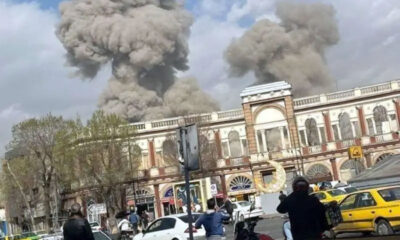
 International2 days ago
International2 days agoSaudi Arabia Denies Lobbying US to Strike Iran as Gulf States Respond to Escalation
-

 International2 days ago
International2 days agoSeveral U.S. Warplanes Crash in Kuwait Amid Ongoing Iranian Strikes
-

 metro2 days ago
metro2 days agoDaddy Freeze Warns Couples Over 40: ‘Avoid Moving Abroad, Especially US, UK’
-
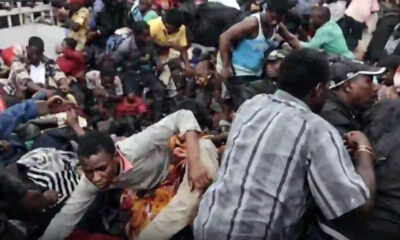
 metro3 days ago
metro3 days agoFour Die in Katsina Stampede During Ramadan Alms Distribution
-
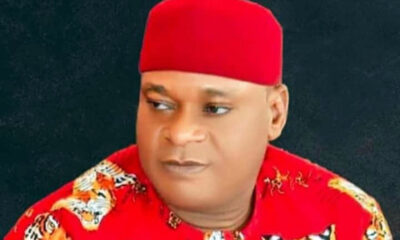
 metro3 days ago
metro3 days agoGunmen Abduct Father of Former Ebonyi Deputy Governor on Way to Church
-

 Business3 days ago
Business3 days agoGlobal Crude Hits $73 as Middle East Tensions Escalate
-

 International2 days ago
International2 days agoIsraeli Airstrikes Kill 31 in Lebanon as Hezbollah Loses Senior Figures



